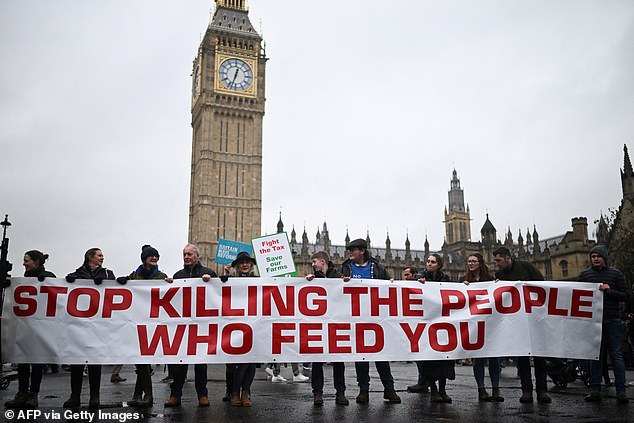Ease the pain of 'farmer harmer' Starmer's brutal inheritance raid

Defiant: Toby, right, and William Findlay on the march
All the stories I heard marching with the farmers last week were troubling. Everyone was desperate to protect their livelihood and pass their farms – this country's backbone – to the next generation. With estates worth over £1million no longer exempt from inheritance tax (IHT), some say this will be impossible.
Chancellor Rachel Reeves' ill-thought-out raid means anyone inheriting a farm worth £1million plus could face a 20 per cent tax on anything above the sum from April 2026 (though still half the 40 per cent rate paid by other estates). The National Farmers' Union fears 75 per cent of the more than 209,000 British farms in Britain could be affected.
Many people I spoke to say they will have to sell up, destroying family farms dating back generations.
But are there any financial solutions? We asked tax experts Mark Levitt, a partner at tax, accountancy and business advisory firm Blick Rothenberg, and Sam Dewes, a partner at HW Fisher.
WILLIAM FINDLAY did not celebrate his 40th birthday with a party but a six-hour trip from the family farm near Falkirk, Stirlingshire, to London.
He is fighting for the survival of spreads such as 130-acre Strathavon Farm, owned by his 76-year-old father Thomas.
He says: 'Dad does not stop. We keep a herd of 100 cattle – Limousin and Simmental – and farms like ours should be treated as cornerstones that feed a nation rather than easy tax targets.'
Farmland in the Lothians costs about £13,000 an acre, says estate agent Strutt & Parker. Strathavon Farm with its land, farmhouse and outbuildings, is worth more than £2million.
EXPERT VIEW: There is a potential tax relief, Conditional Exemption Tax Incentive, if a farm is of historical or architectural interest, has land of outstanding natural beauty or of special scientific interest, or is home to objects of historic or artistic interest. This removes IHT and capital gains tax on these estates.
Levitt says: 'If you find ancient burial mounds or remains of a castle – it could satisfy the relief.'
But you must set up a heritage maintenance fund of £10,000 and more, managed by a professional trustee. You may also have to let the public in at least once a year.
Dewes says another option is taking out a life insurance policy and putting it into a trust. Families still pay IHT upon your death but a whole-of-life insurance policy can pay a lump sum on death that sits outside of your estate if held in trust – and can pay any IHT bill.
The option is not cheap and would cost farmers like Thomas thousands of pounds a month. However, a 50-year-old might pay £1,250 a month for a sum of £1.4 million written into trust.
You could also put your farm in trust – bequeathing the estate to your next of kin on death. Levitt says: 'Setting up such a trust can cost £2,000 to £5,000 – but you must pay 3 per cent of the value of the estate every ten years.
'So, a trust holding a farm worth £10 million and assuming this was still the value after the first ten years – would have to pay a £300,000 IHT charge working out at £30,000 set aside each year.'
ANNABEL WHITBY, 34, is a fourth-generation Warwickshire sheep farmer with a flock of 450 North Country Mules on the 300-acre Brookfields Farm owned by her father Mike Green, 72. He could not make the protest due to a hip replacement op – but could still not be kept off his tractor.
Annabel has two sisters and was hoping to one day take up the farm for her sons George, four, and six-month-old Charlie. But this dream has been destroyed by Labour. Annabel says: 'How am I supposed to buy my sisters out? What we earn gets ploughed back into the farm.
'I run a dog grooming sideline for extra cash. This tax bill will shut down our farm.'
Based on figures by estate agent Knight Frank, an acre of pasture in Warwickshire was £7,920 two years ago, meaning the land may be worth £2.4 million. Including a farmhouse and outbuildings, Brookfields Farm's total worth is more than £3 million.
EXPERT VIEW: Farmers must consider succession planning – including giving away some of the farm to the next generation now.
Levitt says: 'You must live seven years after giving the farm away to avoid IHT. And if you still live in the farmhouse there could be complications from a 'reservation of benefit' gift rule – continuing to enjoy the property while still alive. This could be taxable.
'But if those who are to inherit already share the property you may be OK.' Dewes suggests the inhabitants pay rent to the new owner bequeathed the property to avoid tax difficulties.

Speaking out: The farmers' banner at the protest outside Parliament
LUKE MAYO, 36, and Caroline Howells, 35, have 8,000 free-range poultry on their Dorset farm. They brought their two-year-old son Ruben on the demo.
Luke is a fifth-generation farmer on 125-acre Friar Waddon House farm, which is also used for growing hay, rearing cattle, and sheep. He says: 'Our land was valued at £1.5 million 15 years ago so the next generation could be driven out of business by this tax.'
He adds: 'The only people who are going to make money out of this vindictive new tax are property developers who will snap up land farmers are forced to sell.'
EXPERT VIEW: Dewes says raising the number of owners of the farm can increase the IHT threshold – which for this couple might mean tying the knot. He says: 'A married couple that jointly owns a farm can split it in two – so qualify for £2million of agricultural property relief.
This is on top of the £1million inheritance tax limit all married couples have if they leave a property to a direct descendant. It means you could have a £3 million limit before paying any tax.'
Levitt says farmers such as Luke should make the most of agricultural property relief (APR) capped at £1 million. For Luke, this includes land used for animal pasture and keeping hens, as well farm buildings and the farmhouse.
Levitt says business property relief (BPR) can be used for machinery, and any farm shop.
You can pool agricultural property relief (APR) with business property relief (BPR) up to the £1million individual limit.
The Government says farmers will have ten years to pay IHT. Other estates have just six months.















































































